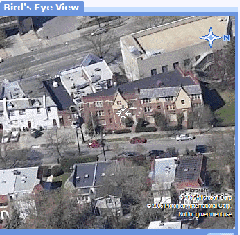Here's a riddle for you: What do the Internet and the real estate market have in common?
Answer: they're both eking all they can out of "Web 2.0" hysteria.
Recently, we've written many entries explaining the Web 2.0 craze and how it has affected everything from social groups to newspapers to politics. What we haven't discussed yet is how the Web is affecting the US real estate market and the way everyday people buy their homes.
As in many other industries, the Web is helping home buyers and sellers alike cut out the filter of the media and other top-down information and marketing services. With the emergence of real estate websites and blogs, home buyers and sellers can throw away the classified and real estate sections of their newspapers. They can forget the phone number of the local real estate agent. And most of all, they can take an active role in finding the home of their dreams by themselves.
Bigger Pockets did a piece on the 7 Coolest Web 2.0 Real Estate sites, and I took a look at some of them here.
The first site I tried was Zillow. This site allows you type in any address and  view the results of your query on a Google map (as in the picture at right). You can zoom in on properties and find out their tax-assessed value. For example, I tried typing my apartment's address, and while it didn't have my building's value, I did find out that the house across the street is valued at $705,000. This basically made me feel really broke, but if I were a potential home buyer, it would be a great tool for getting a general idea of the home values in a particular area. A similar site is Real Estate ABC.
view the results of your query on a Google map (as in the picture at right). You can zoom in on properties and find out their tax-assessed value. For example, I tried typing my apartment's address, and while it didn't have my building's value, I did find out that the house across the street is valued at $705,000. This basically made me feel really broke, but if I were a potential home buyer, it would be a great tool for getting a general idea of the home values in a particular area. A similar site is Real Estate ABC.
If it's listings that you're looking for, then Trulia is the site for you. This site aggregates real estate listings from various websites and realtors and brings them all into one location. Results can be viewed on a Google map, similar to the strategy of Zillow. an extra feature of Trulia is that after clicking on a particluar listing, information about the neighborhood is displayed below the information about the property for sale. This information tells buyers the popularity of that particular neighborhood, how many Trulia listings there are in that area, the average price of those listings, and a little blurb describing the neighborhood. For example, I searched a property in the Cathedral Heights area of DC, and this is the snapshot shown about the area:
Another site that I found interesting was ZipRealty. This is another listing aggregator, but with a twist. By getting a free account with ZipRealty, users can rate and review different listings that they have visited in person. This system has potential benefits for both home buyers and sellers: by reading reviews, potential home buyers will know what properties to avoid and which are worth trekking to see.. Home sellers can read reviews about the properties they put up on the market and judge how they are being perceived, or what they need to change about their house to get it to sell. This rate-and-review system has a lot of potential, but unfortunately, I think it is a bit underdeveloped. I searched through several pages of DC area listings and no properties had been reviewed. In addition, I must note that after registering with ZipRealty, Todd received a sales pitch email and a phone call only hours after using the site. Basically, I would say that ZipRealty is a great idea with sub-par execution.
In addition to these search sites, I found that almost every state has a blog or blog network about buying and selling real estate. Because of all these great resources out there for home buyers, my advice would be to get rid of the newspaper and turn on your computer!
Experimenting with all these sites made it clear that the way people buy real estate, similar to the way people get their news, is changing in accordance with Web 2.0 developments and new free online sources. But I did have one question after investigating these sites. With a struggling real estate market, how long can these sites like Zillow and Trulia succeed?
I think agree with Sharing the Truth one thread at a time's post about real estate 2.0: new real estate sites are only going to survive if they can benefit from significant and established user base. As the demand for new homes that was booming just a few years ago levels out, the ability for these sites to garner new membership and advertising will undoubtedly decrease. It will be interesting to see how these sites evolve (and possibly merge?) according to shifts in the market.
Sign up today to have our latest posts delivered straight to your inbox.